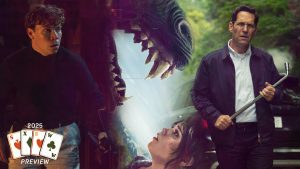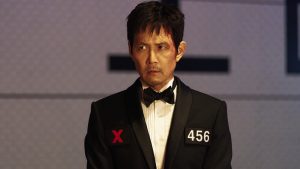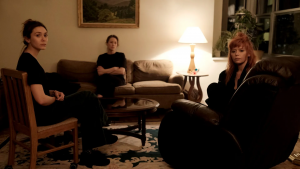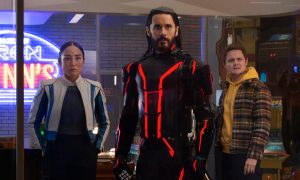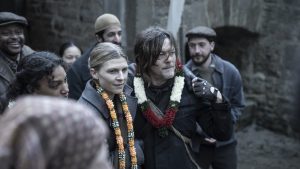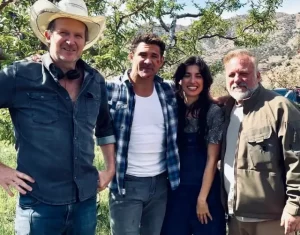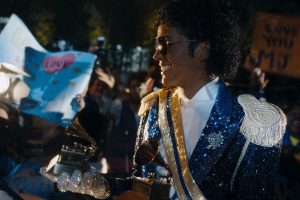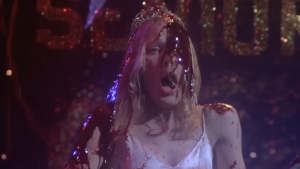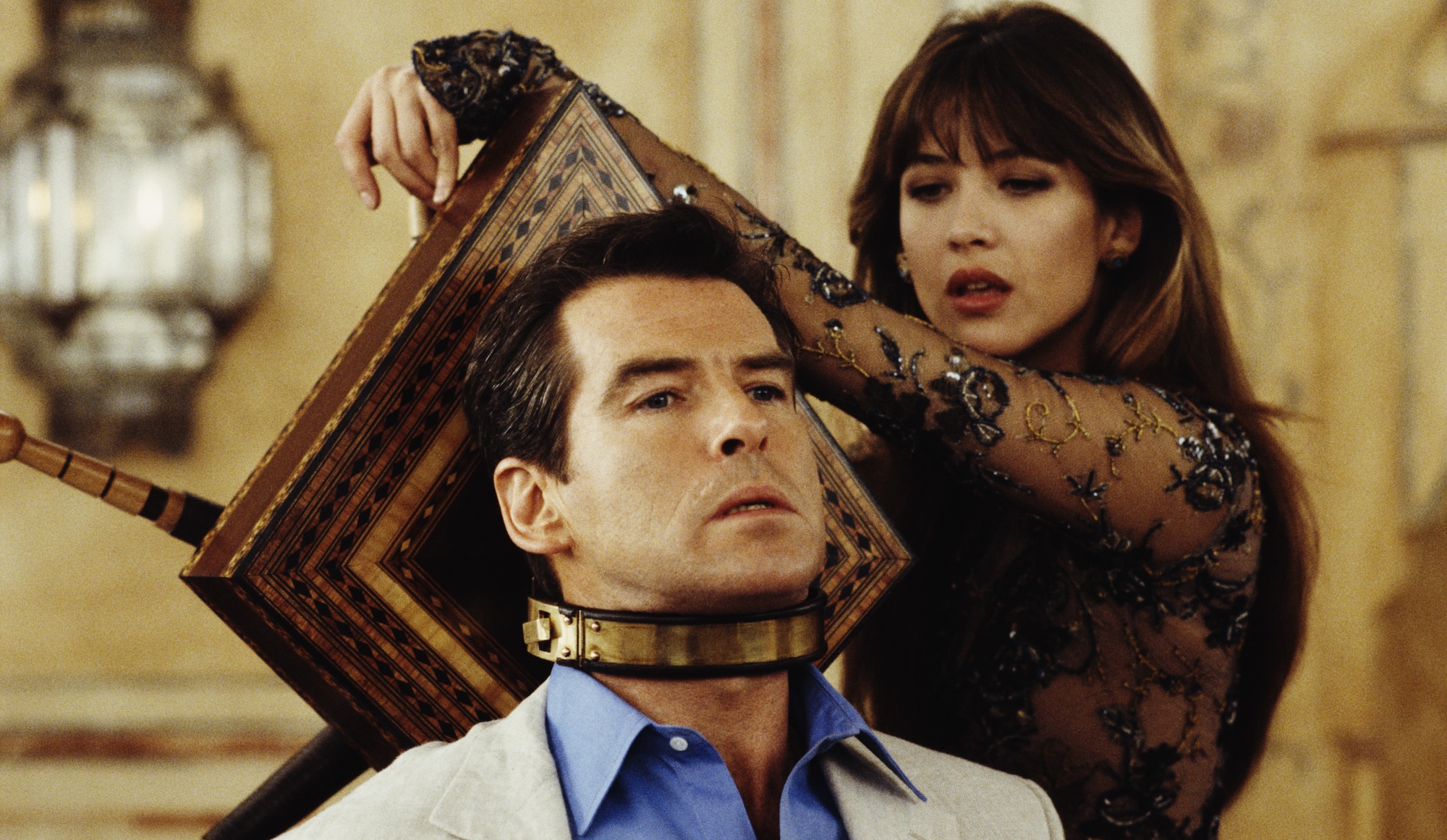
What is the most underrated James Bond movie? That is a question that might have as much to do with when you ask it as it does the films themselves. Take On Her Majesty’s Secret Service for example. Over years and decades, it was generally treated as the black sheep of the Eon Productions canon; the one that was rejected by audiences in 1969 because Sean Connery isn’t there, and the one that would get slipped in very late at night on TBS marathons in the ‘90s because it starred the one-and-done George Lazenby.
Yet today the film’s bittersweet tone and outright tragic ending—with Bond crying over the body of his wife on their wedding day while Louis Armstrong’s “All the Time in the World” is turned into an instrumental weepy—lingers so strongly that Eon more or less remade its elegiac quality, right down to the Louis Armstrong number, in No Time to Die. The brief Timothy Dalton era of 007 movies has undergone similar reappraisal on the internet where fans appreciated his tough, no-nonsense gruffness when juxtaposed with Roger Moore’s silliness. And so it goes. The stock of Bond is always rising and falling.
So, with all that in mind, if you asked me today in 2024 what is the most underrated Bond adventure… I would say the one that just turned 25 years old earlier this month.
It has indeed been a quarter-century since The World Is Not Enough, the third Bond movie starring Pierce Brosnan and the first co-written by Neal Purvis and Robert Wade (scribes who’d have a hand in every James Bond movie since). Generally well received upon release, if not riotously celebrated, The World Is Not Enough was reviewed by critics and fans as a serviceable ‘nother one. This time with Denise Richards as a nuclear physicist, which might have conjured more howls from Gen-X and elder Millennial audiences than the older critics who grew up used to Eon Productions’ casting standards.
Still, as the years passed, TWINE stands largely forgotten by anyone except diehards. And to be fair, no one should (or could) mistake The World Is Not Enough as the gold standard of its series. Nonetheless, there is actually a fairly solid and oft-overlooked soul to this installment. It’s the film where Brosnan felt most confident and in command of his version of 007; the one which brought a graceful end to the ‘90s and post-Cold War era of James Bond; and the movie that burrowed so deeply into Bond and M’s psychologies that Eon covertly remade it during the Daniel Craig era.
There is a case to be made that it is time to recognize The World Is Not Enough as one of the more underappreciated Bond flicks.
A Setup So Good Eon Did It Twice
When producers Barbara Broccoli and Michael G. Wilson broke the story of The World Is Not Enough with their writers, as well as director Michael Apted, the film was going to originally feature one of the subtler pre-title sequences, particularly in the Brosnan era where they were almost all over-the-top. We would be introduced to Bond mid-mission where he interrogates a corrupt banker in Bilbao, Spain and then his life is saved by a mysterious third party as he quietly escapes from the office. The subsequent chase sequence along the Thames River would have then been saved for the very next scene after the opening credits.
Thank Her Majesty for the change, because instead of being a forgettable intro, TWINE features one of the best. It was also the longest ever up to that point with its 14-minute runtime (a record No Time to Die finally broke in 2021). Obviously, this allowed the opening to have more bang for its buck. The opening is now the action highlight of the movie given it culminates with Bond highjacking Q’s tricked out speedboat and pursuing an assassin along London’s Thames. They even wind up, appropriately enough, atop London’s Millennium Dome, a tourist attraction so new and of the moment that it wouldn’t even be open to the public during the movie’s release.
By itself this is just a terrific table-setter, right down to Garbage’s grooving ‘90s alt-rock title song. However, it also introduced one of the most intriguing, and prescient, setups in a Bond film. Rather than just introduce us to 007 wrapping up another case, we see the literal fallout of that mission when the money Bond retrieved from the aforementioned bank is discovered to have a bomb hidden inside its paper: it is used to execute a terrorist attack on MI6 headquarters that leaves one of M’s closest friends dead, and British intelligence—including Bond as an unwitting and physically injured patsy—humiliated.
It’s a prelude to a mission of intensely personal stakes for the wounded Bond, his employer, and MI6 itself, and it rather unintentionally picks up on geopolitical anxieties that would erupt into a bitter, horrifying reality a few years later when massive terrorist attacks on the West became more than just the work of fiction. Perhaps that is one reason Eon more or less remade this exact same setup in one of the production company’s best films, Skyfall. Right down to the terrorist being someone from the past life of Judi Dench’s M, Skyfall feels like a redo of The World Is Not Enough’s themes, remixed for a post-9/11 world (and with the villain being a riff on GoldenEye’s 006 to boot).
Skyfall does it better overall, but the naiveté of The World Is Not Enough’s simple sense of escapism makes it a bit more charming to return to, plus the shots of Bond getting to wreak havoc in ‘90s London without any of the gloom and doom of the Craig era remains an absolute blast.
Brosnan and Dench at Their Best
A movie marking a personal vendetta for both Bond and M has became common place during the Craig era, but it was a novelty in 1999. And in some regards, The World Is Not Enough remains one of the more unique renditions of this growing cliché. Whereas Craig’s Bond had a deep emotional attachment to Dench’s M, with the suggestion of her having groomed him as a troubled, bordering on sociopathic youth like a mother would a child, Brosnan’s Bond enjoyed a relationship with Dench’s M more approaching that of equals and colleagues—which made how they played off each other in this film uniquely interesting.
With exception to Ralph Fiennes’ Mallory in the last couple of Craig entries, the Brosnan era is the only time in the Bond oeuvre where 007 is the old seasoned hand with a foot in the past, and M is the face of the future. The irony of a misogynistic relic of the Cold War like Bond having a woman as his boss practically writes itself, hence how she addresses him with those exact words in GoldenEye. Yet from that frosty introduction Brosnan’s Bond has somewhere to grow with M as the two reach a grudging and, eventually, admiring respect.
That element comes to fruition in The World Is Not Enough, a movie where instead of treating M as just a bean-counter, or as a mother in need of protecting, Bond comes to see her as a real person and confidant. He recognizes she is taking it personal that her school chum (and ex-lover?) from Oxford was killed due to their mutual negligence. But from that recognition the two develop an unspoken trust and camaraderie. They have a mutual interest in redemption.
But then, much of the movie is a showcase for Brosnan’s Bond. In the ‘90s, he was celebrated as a bit of the platonic ideal between Connery’s aggressive swagger and Moore’s dapper silliness. Brosnan walked the line. After Craig entirely reinvented the character as brooding bruiser who grew out of his “blunt instrument” youth, Brosnan’s goldilocks approach was dismissed, particularly by online fandom who typically prefer the “seriousness” of Craig, or for that matter Dalton. Yet perhaps because I grew up in the ‘90s, I’ve always had affection for Brosnan’s lighter touch, which was often more nuanced than detractors would suggest. And that styling was never so bespoke as in TWINE. While GoldenEye easily remains the one great Brosnan Bond movie, as with most 007 actors he was still finding his interpretation of the character in the first outing.
By the time TWINE came around, though, the actor and producers knew exactly who this version of Bond was. He still has the charm and humorousness of both Connery and Moore, but there is also a wearied sadness and melancholy there. He is not a brooder like Craig (and probably like how Brosnan would have preferred to see the character written), but this Bond has lived through the Cold War, betrayals, and long empty nights. The charisma feels like a defense mechanism, and perhaps his weapon of last resort.
And we see what happens when those defenses are circumvented after he meets the next great love of his life, as well as one of the more under-appreciated baddies in the series…
One of the Better Villains
Many internet pixels have been spilled about Denise Richards as Dr. Christmas Jones. The former American model is spectacularly miscast as a nuclear scientist. Still, I would point out that not much more so than many of the other Bond movie casting choices in previous decades. Think of the Bond Girls who were later dubbed because of wooden line deliveries—or the ones who were introduced as fellow espionage professionals and then asked to just blankly run around in a bikini by the producers. The backlash to Richards’ casting says perhaps more about how audience expectations for women’s leading roles had changed in the 40 or so years between Dr. No and TWINE while Eon’s had not.
However, it should be noted that Christmas is not a lead in The World Is Not Enough. She is a character who sadly only exists so Bond has a love interest at the end of the film. And even in that pretext, she is at least written as competent in her expertise, even as the producers dubiously dress her up like ‘90s era Lara Croft for half the movie. Even so, she is tertiary to the central dynamic of the film: a romance between James and a woman named Elektra (Sophie Marceau).
While On Her Majesty’s Secret Service has been reevaluated as a Bond classic, in 1999 it was still largely a black sheep. Which makes the choice to essentially subvert it bold. And the twist where the woman Bond falls in love with this time turns out to also be the real villain is bolder still.
It is indeed one of the cleverer plot contours in the series when Bond and the audience discover at roughly the same time that the terrorist we’re introduced into believing is the mastermind villain, Robert Carlyle’s adequate Renard, is actually a patsy. He is a dupe as easily manipulated by Elektra King as as 007. She is the film’s surprise femme fatale who intentionally echoes Diana Rigg’s beloved Teresa di Vicenzo. For like Tracy, Elektra comes from a wealthy family (Bond always loves refined things, no?) but is damaged from that privileged lifestyle. Quite literally, as we learn she was tortured and maimed when she was kidnapped for an extended period by Renard.
Initially, Bond and the audience is led to suspect that she was manipulated or seduced, much like the dubious and disputed pop culture image surrounding the Patty Hearst abduction. However, even that proves a red herring. As the film unfolds, we learn Elektra has manipulated Bond and M, as well as the viewers. In truth, Elektra seduces Bond by representing everything he loves, even as she also embodies everything he usually despises in a man: intensely privileged breeding, a sense of entitlement, and, finally, megalomania. She considers her family’s oil holdings in Russia as her birthright, and will kill anyone who keeps her from it. Beginning with her father.
As misjudged as casting Richards as Christmas Jones was (especially since rumors suggest Monica Bellucci was also in the running for the role), the film ultimately lives or dies based on the dynamic between Bond and Elektra, and casting an actress as adept as Marceau works wonders for the film. She and Brosnan kindle a sincere chemistry, just as the erudite French actress has enough playfulness to imbue Elektra’s later villainy with a fanged cruelty.
It makes the actual climax of the film one of the best moments in Brosnan’s tenure. Thirty-seven years after Connery’s Bond coldly assassinated Professor Dent in Dr. No, Brosnan’s 007 is forced to shoot Elektra King in cold blood. It feels uglier than how we’re used to seeing the Brosnan version of the character. Earlier in the movie, the character went so far as to acknowledge that “cold-blooded murder is a filthy business.” But doing it to a woman he loved for at least one night is a kind of self-abnegation. You can see it on Brosnan’s face as he holds the gun and begs for her to call off Renard and their scheme.
You buy Elektra’s misplaced confidence when she smirks, “You wouldn’t kill me. You’d miss me.” It sets up a typical Brosnan one-liner, though this one with venomous irony after he executes her: “I never miss.” But in the same breath, Dench’s M arrives on the scene to witness a perverse tableau. Bond is visibly mourning the woman he murdered by brushing her hair. The moment is melodramatic but also faintly disturbing, including to M. It also gestures toward a quality of the character that would become dominant in the Craig era.
It’s also such a striking moment that it wreaks havoc on the rest of TWINE’s finale, which has no more oxygen as Bond obligatorily kills Renard in a crashed submarine and saves Christmas.
The End of an Era
Ultimately, The World Is Not Enough has a number of good moments like the Thames chase sequence or the death of Elektra King. The shootout between Bond and Renard in a nuclear missle silo is also ‘90s cheese, but of an entertaining flavor as Brosnan hops on chains designed to transport atomic weapons and uses them as a carnival ride while outrunning a fireball. There is also a touching sendoff to Desmond Llewelyn as Q and a surprisingly taut action sequence about navigating oil pipelines.
But it is easy to admit the sum is lesser than the parts. There are a couple of action sequences that feel quite rote and strangely lacking for a Bond flick, such as the worst ski set-piece in the series and the aforementioned submarine fistfight. As good as Elektra is, the choice to keep Renard as the final heavy, presumably because he is a man, disservices the movie.
Yet one cannot wonder if the film, and perhaps Brosnan’s whole tenure, might be better remembered if this had been the final entry of his run. While I am of the camp who thinks it is a shame that Brosnan didn’t get a fifth film in the early 2000s to close out his era on a better note than Die Another Day, the flip side might have also been true. Brosnan’s interpretation of the character feels incredibly, inescapably rooted in the ‘90s. It is of that moment where the Cold War was over but the 20th century still had life left in it. During roughly that decade before terrorist attacks in 2001 changed the world for the worst, shortsighted optimists believed they were living “at the end of history.” They might have even argued the world had no more use for characters like James Bond.
The three films Brosnan made between 1995 and 1999 absolutely tap into the anxieties of that moment, complete with TWINE’s still timely narrative about Europeans willing to kill over getting oil out of Russia (or Tomorrow Never Dies‘ satire of conservative media propaganda). In this context, TWINE acts as a bookend on elements introduced in GoldenEye. Robbie Coltrane as the best 007 contact in the series since Kerim Bey returns in the role of Valentin Zukovsky, a former KGB spymaster turned gangster. In GoldenEye, he wanted to permanently maim Bond for a Cold War injury Zukovsky sustained, but by the end of TWINE, he utilizes his last breath to save James’ life, confident Bond will avenge them both.
The film also sees Dench’s M and the audience finally recognize an implicit question she had for Bond in GoldenEye. Can you still be useful? The answer is yes, even if it rots away at another level of Bond’s soul with one more dead lover in his arms.
The World Is Not Enough is not top shelf Bond, but it might be at the top of the mid-tier pack. And just as it took about 20 years for even Dalton’s most uneven Bond film, Licence to Kill, to get its due, now seems apt for The World Is Not Enough to receive a couple of flowers of its own. If only for Elektra’s funeral.
The post The World Is Not Enough Is the Most Underrated James Bond Movie appeared first on Den of Geek.
